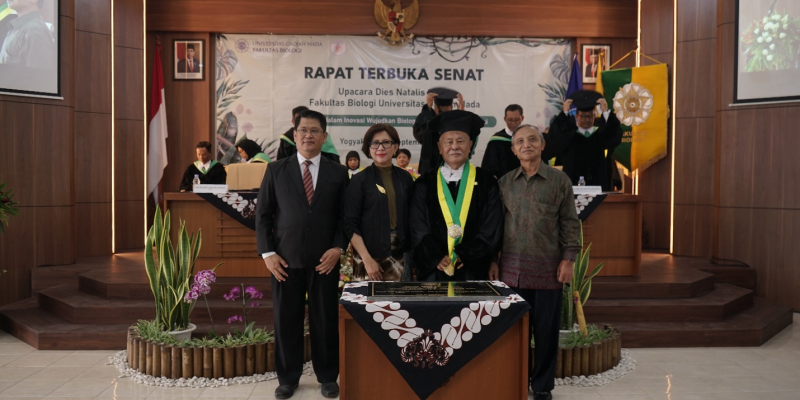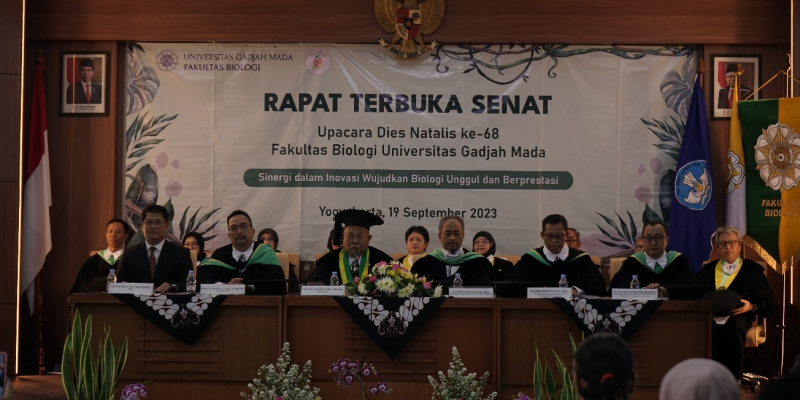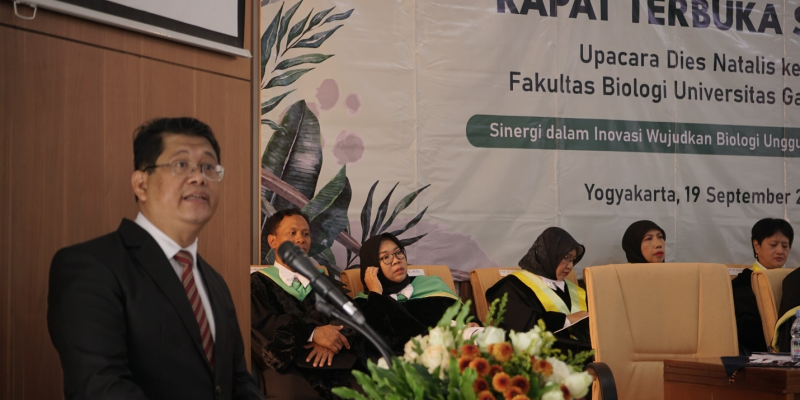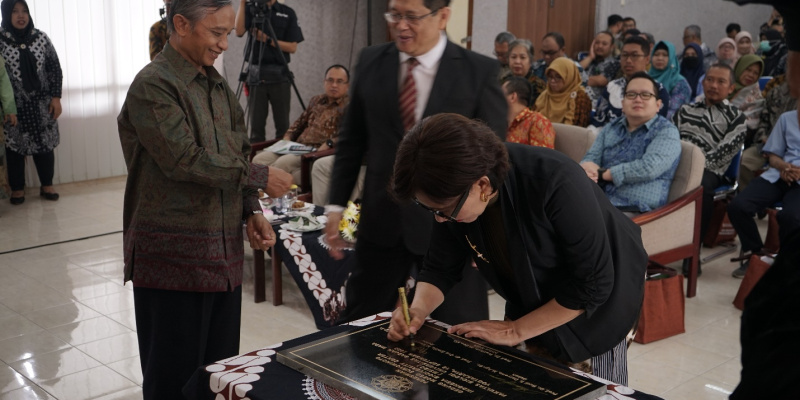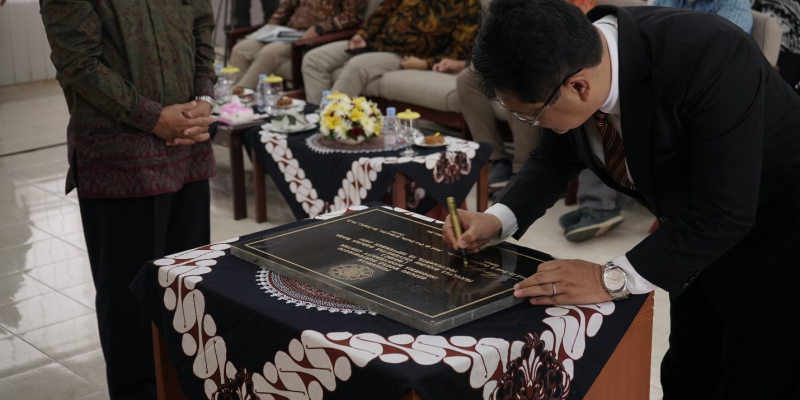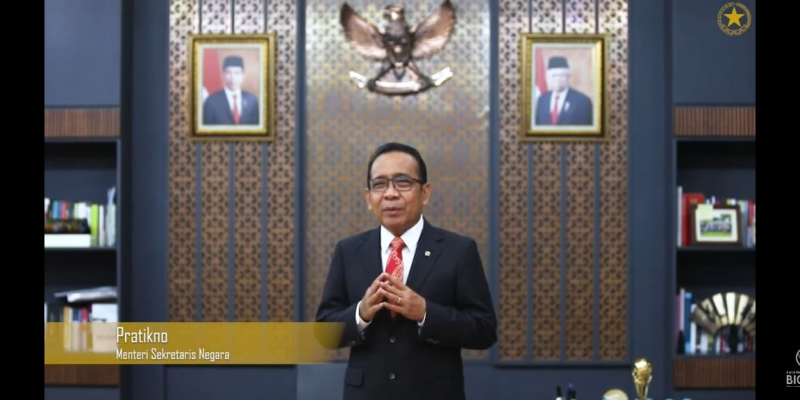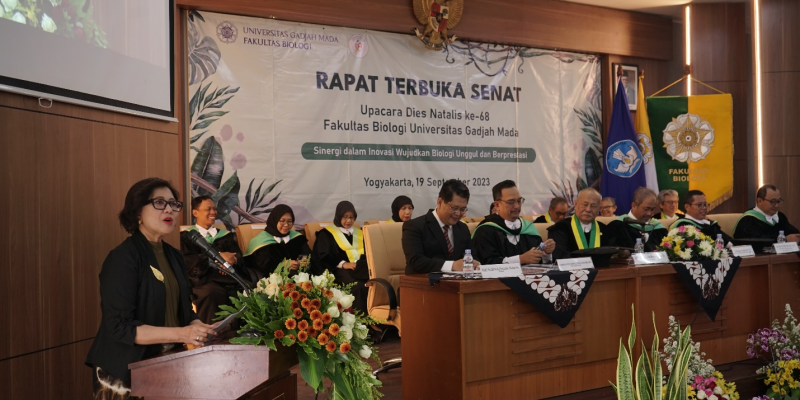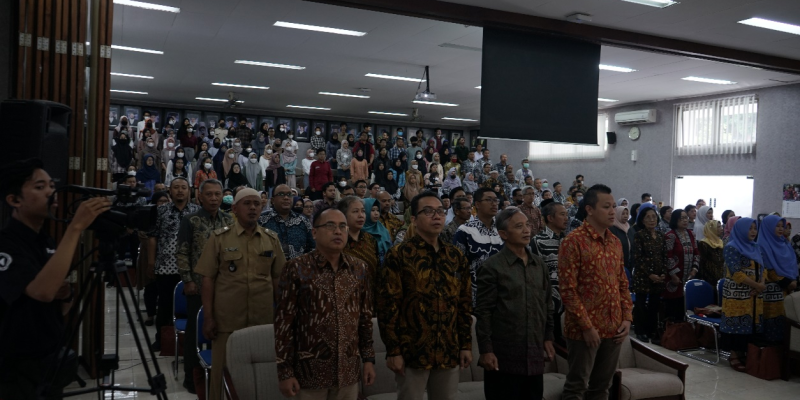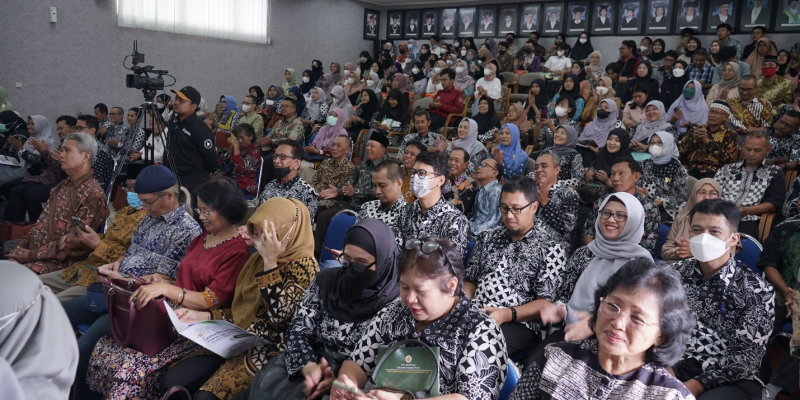Yogyakarta, 19 September 2023 – Faculty of Biology UGM held the 2023 Senate Open Conference at the Tropical Biology Auditorium with the title “Synergy in Innovation to Create Superior and Achievement Biology”. The Senate Open Conference was also part of celebrations for the 68th Anniversary of the Faculty of Biology UGM. The Conference was attended by the entire academic community of the Faculty of Biology including senate, dean, lecturers, staffs and student representatives, as well as invited guests, alumni, partners and Dharma Wanita Faculty of Biology UGM.
Prof. Dr. Suwarno Hadisusanto, S.U. as Chair of the Faculty of Biology UGM Senate opened the Senate Conference and continued with singing the national anthem “Indonesia Raya”, followed by “Hymne Gadjah Mada”, and “Biology March” as well as a joint prayer led by Tyas Ikhsan Hikmawan, Ph.D.
Prof. Dr. Ova Emilia, M.Med. Ed., Sp.OG (K), Ph.D., Chancellor of Universitas Gadjah Mada also attended the Senate Open Conference and delivered her opening remarks. “There is great potential for support from biological sciences to support various sectors such as health, agriculture, food and other advanced products. “The presence of technology that disrupts life also influences and encourages various innovations, including new biotechnology and biomolecular studies,” said Prof. Ova in her speech (20/9). The UGM Chancellor also said that the phenomenon of future technological development requires us to be open in scientific development so that collaboration across scientific disciplines is necessary for innovation leaps in the future.
The signing of the inscription for the inauguration of the MSIBC (Moeso Suryowinoto Indonesia Biodiversity Center) Building was then carried out. The signing was carried out by the Chancellor of UGM, Prof. Dr. Ova Emilia, M.Med. Ed., Sp.OG (K), Ph.D. and Dean of the Faculty of Biology, Prof. Dr. Budi Setiadi Daryono, M.Agr.Sc., accompanied by Prof. Chairil Anwar from the Board of Trustees UGM and Prof. Dr. Suwarno Hadisusanto, S.U. as Chair of the Senate Faculty of Biology UGM.
Prof. Dr. Budi Setiadi Daryono, M.Agr.Sc. as Dean of the Faculty of Biology then delivered his remarks as well as the Annual Report of the Faculty of Biology UGM. He explained that the Faculty of Biology has demonstrated its position on the international stage, demonstrated by obtaining ASIIN accreditation since 2018 and successfully maintaining its position at 501-550 in the world for Biological Science, as well as the best in Indonesia based on the QS World Ranking. The Faculty of Biology has also carried out visitations for ASIIN reaccreditation for Bachelor’s degrees and ASIIN accreditation for Master’s programs, and is being prepared for ASIIN accreditation of Doctoral programs in 2024. In 2023, the Biology Faculty has graduated 3 students from the International Undergraduate Program which has been accepting students since 2019.
“Biology as a branch of science continues to develop following the stages of the industrial revolution. One of the instruments is metaverse which relies on more complex system applications such as AI, virtual reality, augmented reality,” Prof. Budi added in his speech (20/9). He also highlighted the multi-dimensional crisis due to climate change and global political dynamics. The development of biology towards the metaverse will be a great opportunity in overcoming this problem. This is also in line with support for the achievements of the Sustainable Development Program (SDGs), especially in improving the quality of inclusive education (SDG 4), handling climate change (SDG 13), preserving ecosystems on land and water (SDG 14 and SDG 15).
In his annual report, the Dean of the Biology Faculty also highlighted international exposure which was greatly increased during this period as an effort for the Biology Faculty to become internationally known and improve student experience. This is demonstrated by exposure in the form of student exchange activities and double degrees for undergraduate, postgraduate and doctoral programs.
Improving the quality of education in accordance with SDG 4 is also demonstrated by the plan to open the Bachelor to Masters Fast Track Program and the Life Curator Professional Study Program (PKKH). Prof. Budi also conveyed student achievements including 50 national level achievements and 4 international level achievements in this period, as well as the Faculty of Biology which has the first Biotechnology Competency Test Center (TUK) in Indonesia in collaboration with LSPS and BNSP. Also presented were financial reports, improvements in infrastructure and facilities to support the tri dharma of higher education including the MSIBC Building which was launched on the same day as the Senate Open Conference, an organic waste management program which was participated in by various groups as an effort to create an environmentally friendly campus and support the implementation of SDGs, especially in improving the quality of healthy life (SDG 3).
Next, we presented the achievements of research studies, international publication achievements of Faculty of Biology lecturers, and the development of journals published by the faculty, including the Journal of Tropical Biotechnology and Biodiversity (JTBB) which is indexed by Scopus Q4 and the Berkala Ilmiah Biologi which already has an ISSN. Data on increasing community service and cooperation at both international and national levels, visiting professors and alumni activities were also presented. Prof. Budi also conveyed the implementation of the 7th National Tropical Biology Seminar and the 6th International Summer Course on Tropical Biodiversity and Sustainable Development which were attended by hundreds of participants from various institutions and countries.
The next scientific speech was delivered by Prof. Dr. Pratikno, M.Soc.Sc., Minister of State Secretary of the Republic of Indonesia and Chair of the Board of Trustees Universitas Gadjah Mada. “Biology studies have great potential. Indonesia is rich in natural resources, vast areas, extraordinary biological riches” Prof. Pratikno started his scientific speech (20/9). Prof. Pratikno highlighted future challenges in the form of a food crisis and increasing food needs in line with the increase in population, especially in third world countries with population growth above one percent. Increasing food production capacity needs to be done to avoid hunger in the future, but this is faced with the challenges of decreasing the amount of agricultural land, climate change, long droughts, rising sea levels which can cause crop failure. He conveyed that the role of biology is very vital in the use of technology to overcome these challenges. The use of alternative energy, namely bio-energy such as bio avtur and bio diesel, is considered to be able to support a green economy to reduce emissions and environmentally friendly sustainable development.
Prof. Pratikno then said that the contribution of biology to human health stems from the closeness of the study of biology to medicine at the time of its founding. The development of health science towards precision medicine, which aims to increase the accuracy of diagnosis for each individual, places biological science as central along with medical science. Initiation of the development of biomedical science as an initial embryo involving various scientific disciplines within it and continuing to develop towards leading technology including involving the use of AI, VR and management of Big Data in the form of a bio-repository.
“Biology has a central role in developing research and knowledge in various fields, food, energy and biomedicine,” said Prof. Pratikno when ending his scientific speech. He stated that biology is a science that continues to develop and can become a vital science in Indonesia’s progress.
The Senate Open Conference ended with a closing remarks by the Senate Chair of the Faculty of Biology, Prof. Dr. Suwarno Hadisusanto, S.U. It is hoped that the Open Conference as part of the celebration of the 68th Anniversary of the Faculty of Biology can trigger the enthusiasm of the academic community so that the Faculty of Biology can continue to develop and provide benefits to the nation and state.

